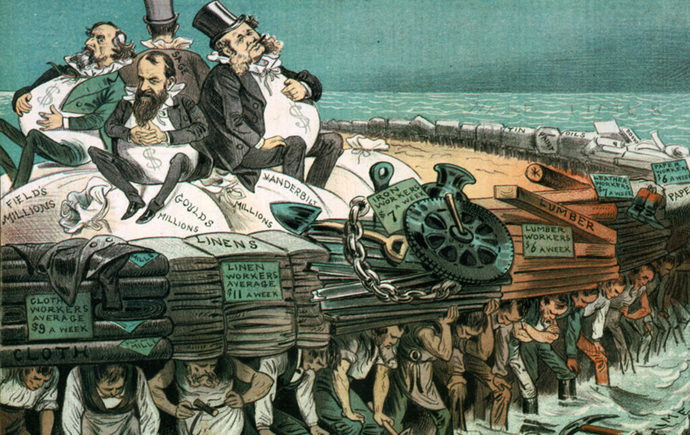
Background
Capitalism originated in Europe during the Middle Ages and Renaissance, gaining prominence in the 18th and 19th centuries with the Industrial Revolution. It's characterized by private ownership, free markets, and profit-seeking. The Enlightenment influenced its ideas, and the Industrial Revolution marked a shift toward industrial capitalism with factories and wage labor. Economists like Adam Smith supported minimal government intervention. In the 20th century, capitalism evolved with mixed economies, and the Cold War highlighted its contrast with communism. Today, globalization and technology continue to shape capitalism, posing challenges like inequality and environmental issues.
——
Communism emerged as an idea in the 19th century, notably with Karl Marx and Friedrich Engels. It envisions a classless society where the means of production are collectively owned, aiming to eliminate social inequality. The Russian Revolution in 1917 led to the establishment of the first communist state, the Soviet Union.
In a simplified sense, communism seeks to eliminate private ownership, promote equality, and create a society where resources are shared. However, practical implementations have faced challenges, and by the late 20th century, many communist states underwent significant changes or collapsed. Despite this, communism has left a lasting impact on political and social thought.
——
Communism and capitalism both play roles in shaping gender equality through feminism.
Capitalism can influence feminism by affecting economic opportunities and reinforcing gender roles. Feminists within capitalist systems often advocate for equal pay and opportunities to address these inequalities.
Communism aims for a classless society and collective ownership, providing a foundation for addressing gender equality. The idea is that by eliminating economic disparities, communism can contribute to breaking down gender-based inequalities as well.
In essence, both systems can impact feminism: capitalism prompting calls for equal economic opportunities, and communism striving for broader societal equality that includes gender.
——
Rome
Before the Punic Wars, men in ancient Rome were highly esteemed for fulfilling virtues such as courage, loyalty, and military prowess. Being a skilled soldier and demonstrating bravery on the battlefield were paramount. Men were recognized and rewarded based on their adherence to these virtues, contributing to their social standing and honor within Roman society. This emphasis on martial virtues reflected the importance placed on military success and valor in the pre-Punic Wars era.
Following the costly Punic Wars, especially the Second Punic War, there was a notable shift in the role and influence of women in ancient Rome. With many men lost in battles, women found themselves assuming more responsibilities in both the household and broader society.
The absence of a significant number of men created opportunities for women to manage family affairs, including financial matters. Widows often took charge of family estates, making important decisions in the absence of their husbands. This increased participation in economic matters gradually expanded the influence of women beyond traditional domestic roles.
Furthermore, the societal upheavals caused by the Punic Wars prompted a reevaluation of gender roles. Women began to gain more recognition for their resilience and contributions during times of crisis. This shift laid the groundwork for a gradual expansion of women's influence and status in Roman society, although full equality remained a distant goal.
In summary, the aftermath of the Punic Wars marked a period of increased responsibilities and recognition for women in Roman society, as they stepped into new roles and gained a greater foothold in various aspects of life.
——
Once women gained financial power, the standards for what a man had to be increased significantly. Women were no longer "awarded" based on good conduct like a man (such as being a good soldier); instead, they were essentially acquired with fame and money. Consequently, the elites started accumulating vast amounts of wealth, engaging in overspending, and so on. They overspent to the extent that they no longer had sufficient funds to pay their soldiers. The demise of the Roman republic was imminent until Caesar declared himself emperor, by directly compensating his troops with a substantial amount of money obtained from the spoils of war.
 Holidays
Holidays  Girl's Behavior
Girl's Behavior  Guy's Behavior
Guy's Behavior  Flirting
Flirting  Dating
Dating  Relationships
Relationships  Fashion & Beauty
Fashion & Beauty  Health & Fitness
Health & Fitness  Marriage & Weddings
Marriage & Weddings  Shopping & Gifts
Shopping & Gifts  Technology & Internet
Technology & Internet  Break Up & Divorce
Break Up & Divorce  Education & Career
Education & Career  Entertainment & Arts
Entertainment & Arts  Family & Friends
Family & Friends  Food & Beverage
Food & Beverage  Hobbies & Leisure
Hobbies & Leisure  Other
Other  Religion & Spirituality
Religion & Spirituality  Society & Politics
Society & Politics  Sports
Sports  Travel
Travel  Trending & News
Trending & News
Most Helpful Opinions